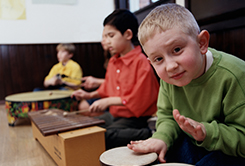Positive Impact on Elementary Students’ Math Achievement Found for Wolf Trap Foundation’s Teacher Professional Development Program
Elementary students outperform their peers in mathematics when taught by teachers using an arts-integration approach, finds a four-year AIR evaluation of a Wolf Trap Foundation for the Performing Arts teacher professional development program.
 AIR evaluated Wolf Trap’s Arts in Education Model Development and Dissemination (AEMDD) grant project, beginning in 2010 when the grant was awarded by the U.S. Department of Education.
AIR evaluated Wolf Trap’s Arts in Education Model Development and Dissemination (AEMDD) grant project, beginning in 2010 when the grant was awarded by the U.S. Department of Education.
Based on a randomized controlled trial in 22 elementary schools in a large suburban Virginia school district, the evaluation examined the implementation of the program and assessed its impact on teacher practice (use of performing arts strategies in particular) and students’ mathematics knowledge. It found:
- Impact on Teacher Practice: About one third (32.3 percent) of the observed lessons taught by treatment teachers provided opportunities for arts integration, compared with just 17.9 percent for control teachers. Among the lessons offering such opportunities, the lessons taught by treatment teachers demonstrated a significantly higher level of arts integration than those taught by control teachers on both the overall measure of arts integration and one of the four specific measures of arts integration (e.g., Linking Arts with Math).
- Impact on Student Achievement: The program had a statistically significant positive impact on students’ mathematics achievement in both the first and the second years of implementation. Students participating in Wolf Trap’s Early Childhood STEM Learning Through the Arts (Early STEM/Arts) demonstrated better math achievement compared to control groups.
In addition, the evaluation hypothesized that the following factors may have played a role in the positive results:
- Treating the earliest grade level. The grant worked with pre-kindergarten and kindergarten classes. For many students, the class was their first time in a formal school environment and their first opportunity to learn English. Teachers commented that the use of music, movement and dramatizing concepts was beneficial for all students, but in particular for students who were shy, who had never been to school, or who were speaking another language.
- Contribution to teachers’ mathematics instruction. While most teachers had many years of classroom teaching experience and knew the district standards, the use of performing arts strategies linked to mathematics concepts may have provided an instructional boost for teachers—making abstract concepts more real and accessible for the class.
- Improved classroom interaction. Wolf Trap summer institutes and residencies introduced strategies such as giving children the opportunity to lead, asking intentional questions, and giving formative feedback. The increased attention given to student participation, teacher feedback and improved classroom structure may have contributed to student learning.
The Wolf Trap program used a combination of annual summer institutes and in-classroom coaching during the school year. In the summer institutes, teaching artists in the disciplines of dance, music and drama worked with teachers in teams to develop standards-based performing arts and mathematics experiences. During the school year, teachers and teaching artists worked together to plan and implement classroom lessons. For example, when working with a music artist and studying the value of money, a teacher might introduce differences in amounts with a song and use the musical element of steady beat to highlight the differences in value.
